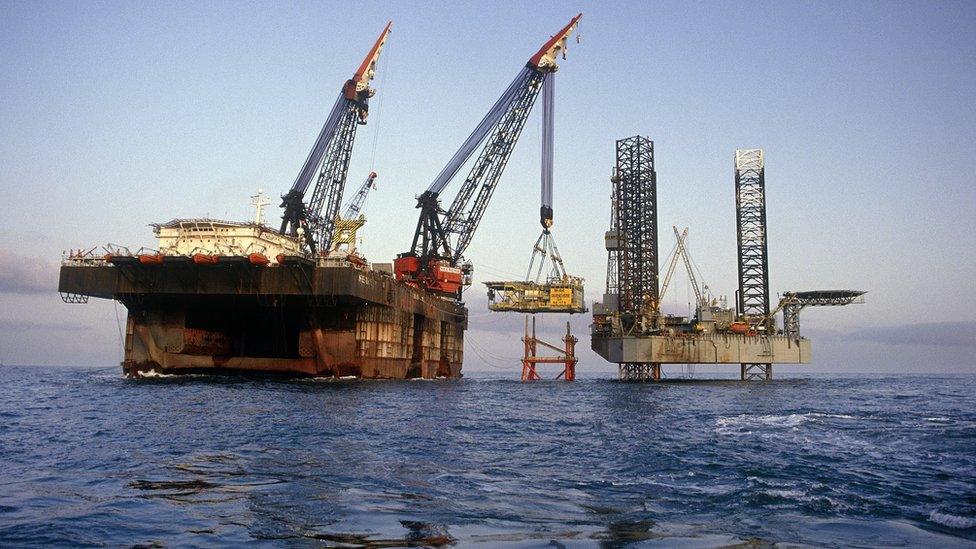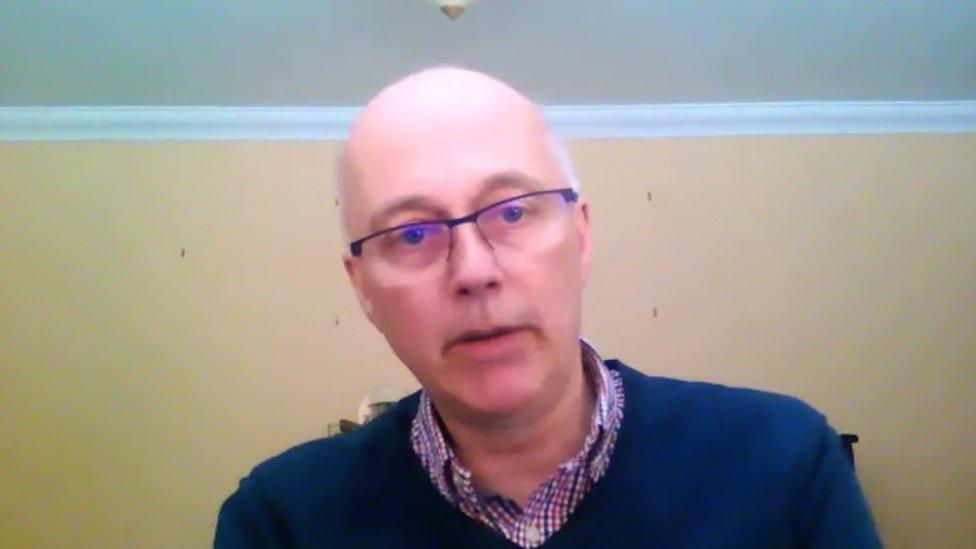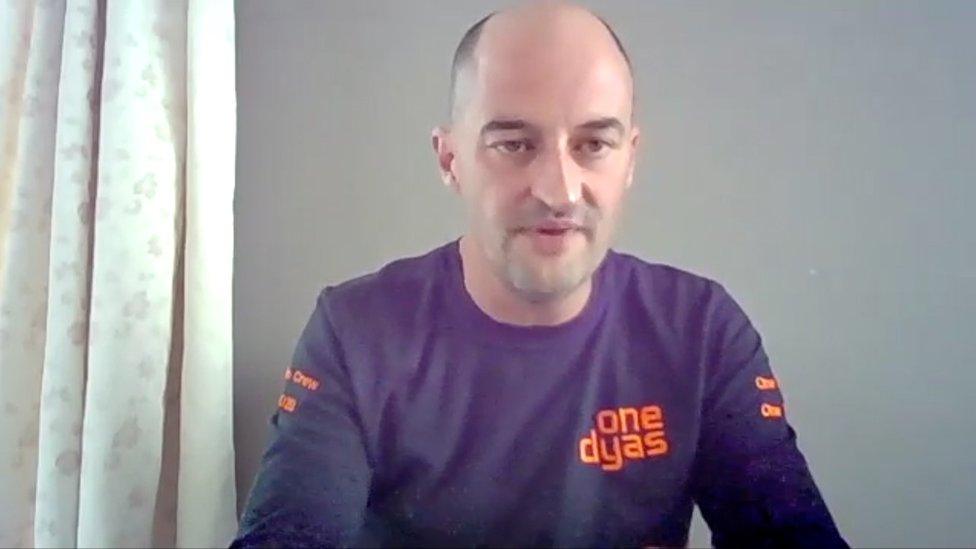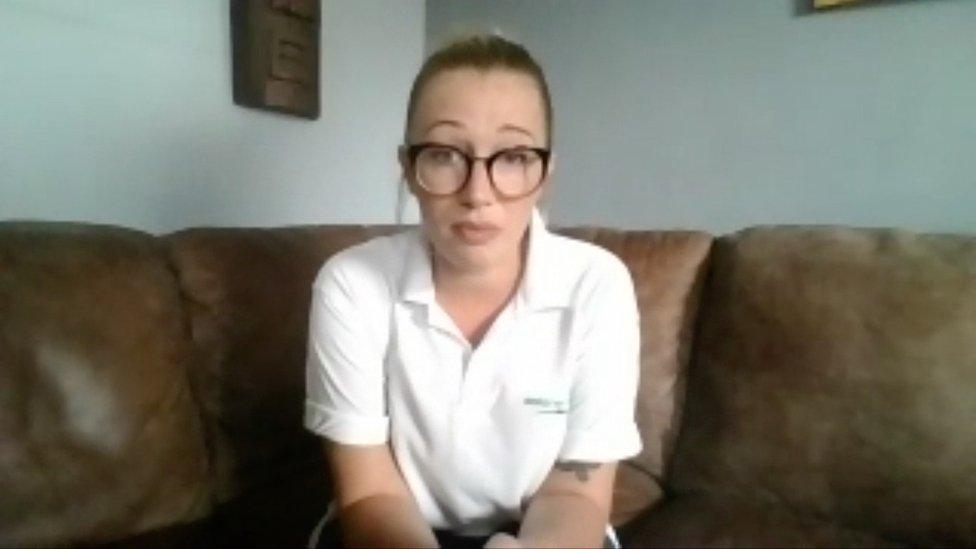Coronavirus: 'Covid copter' flights in offshore worker rescues
- Published

Helicopters have been used to bring workers with coronavirus symptoms back from offshore platforms
More than 200 offshore energy workers displaying mild symptoms of coronavirus have been "repatriated" since the outbreak began, it has emerged.
The offshore oil and gas industry employs about 25,000 people across the UK.
Specially adapted helicopters have been used to bring workers with suspected symptoms back to land.
Oil and Gas UK (OGUK) said when the outbreak began in March "it caught everyone a bit by surprise".
Trevor Stapleton, OGUK's health and safety director, said: "If you go back to the early days in March, I would accept any criticism from the workforce asking 'where are we, why have we not got precautions in place?'"

Trevor Stapleton said he wanted to see screening and testing like that introduced in the eastern region and in Aberdeen brought in across the UK
There were significant concerns at the start of the outbreak, he said, about the impact coronavirus could have within the confined space of an offshore installation. A rapid spread through an offshore installation would cause not just a major medical issue but also the shutdown of a platform, which in turn would affect the UK's energy supply.
While describing the industry's early experience of Covid-19 as a "rollercoaster for all involved", he said: "It's a testament to the industry and I'd challenge any other industry to be able to demonstrate they've done what the offshore industry has done - it has been amazing."
The plan developed by the pandemic steering group had four key strands: stopping the virus getting offshore, transporting workers to and from platforms safely, introducing social distancing at gas and oil installations and dealing with suspected cases when they arose.
As those measures have been embedded, the number of workers needing a "Covid copter" flight to bring them back to land has dropped from a high of 56 a week at the start of April to just three last week.
It is not known how many of those airlifted back to land tested positive for coronavirus.
"It is great to see those numbers dropping down," said Mr Stapleton. "Whatever it is we're doing, it is working."

Paul Tyman, senior health and safety adviser for operator ONE-Dyas, described offshore work in the North Sea as one of the world's harshest environments
Paul Tyman, senior health and safety adviser for exploration and production operator ONE-Dyas, said: "Offshore is one of the harshest environments on the planet anyway, just by its very nature, and the North Sea is notorious for how rough it is and how difficult it is to operate there.
"To then take that environment and then we have a gas processing facility and then a hotel, for want of a better word, on top of that, and then an airport on top of that.
"Each of those individual components on land are challenging in themselves, but when you stack those things together and then you put it in the middle of the sea, anything and everything you do becomes a major challenge - getting food, getting supplies, medical treatment and equipment and all those kinds of things.
"It is a difficult place to do that anyway, but to do that in a Covid environment is certainly challenging."
He said platform operators had had to introduce measures designed to keep people apart in a "very confined space".
In practice, this has meant reduced manning levels, extensive testing before workers fly offshore, staggering meal times, frequently decontaminating equipment, reducing double occupancy in cabins and removing anybody showing any symptoms of coronavirus from platforms as soon as possible.
In the east of England, SSI Energy has partnered with helicopter operator CHC to introduce a medical screening regime for workers heading offshore and to run Covid copter missions when required.
Duncan Higham, SSI's managing director, said at one stage his company was "doing several repatriations a week".

Heli-medic Marie Stephenson said flights could get "a little bit warm when you're in full PPE"
One of the heli-medics involved is Marie Stephenson, of Great Yarmouth.
Describing the layout of a Covid copter, Ms Stephenson said there was a protective screen between the pilots in the cockpit and her sitting back to back with the pilots, connected via a headset, in the main compartment. The patient is then placed on the back row of the helicopter.
"As soon as the passenger is on board, the air conditioning is turned off in the passenger cabin," she said. "So it can get a little bit warm in there when you're in full PPE (personal protective equipment), as you can imagine - but it is for their own safety.
"We are taking all the measures we possibly can."
Looking to the future, Mr Stapleton said he wanted to see the screening and testing introduced in the eastern region and in Aberdeen brought in across the UK.
"We've got to get back to pre-Covid manning levels and start to deal with the backlog of work that is there," he said.